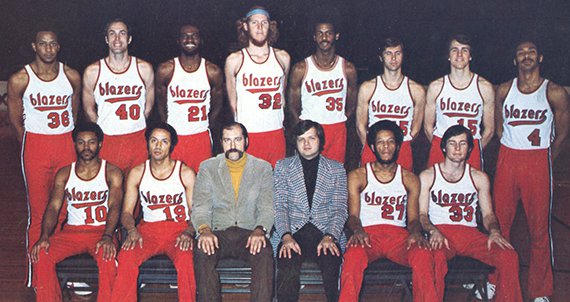
Bill Walton (1952-2024)
Bill Walton, according to Jack Ramsay
I followed Bill Walton’s illustrious career at UCLA under legendary coach John Wooden and was a great admirer of his skills and how he performed within the team structure. Bill played on Bruins teams that won two NCAA championships (1972 and 1973) and won an amazing 88 consecutive victories. He was the College Player of the Year for three consecutive years and was picked first in the 1974 NBA draft by Portland. I had never met Bill or coached against him in his two NBA seasons because of his frequent injuries.
When I became the Blazers coach in June of 1976, Walton was the first player I visited. I looked on Bill as the team’s key player and knew that if the Blazers were to become a winner—something that hadn’t happened in their six-year history in the NBA—Bill and I had to be on the same page regarding the team’s style of play and his role in it.
Walton had undergone recent wrist surgery, and his arm was in a cast when we sat down to chat in the living room of his home in Portland. I described the team game I wanted the Blazers to play and how I expected it to revolve around him on offense and defense. He appeared to like the ideas I presented and listened attentively when I suggested how he could improve his own game. He nodded affirmatively when I told him that, when his wrist healed, he needed to work on developing a jump hook with either hand in the basket area.
I also asked for his opinion about the rest of the team’s personnel, and he responded with candor and objectivity. We talked for over an hour, and I felt good about what I heard. Then, as I got up to leave, he said, “One more thing, Coach. Don’t assume we know anything.”
I could scarcely believe my ears! Here was one of the best players in the history of college basketball telling me that he and his teammates needed coaching. My feet hardly hit the pavement as I left his house. I could hardly wait to relate the conversation to my assistant, Jack McKinney.
Before the first practice at training camp that fall, I noticed Walton shooting pin-point accurate jump-hooks with either hand as the players warmed up. It was the first indication that Walton was on board with my game plan and that the Blazers might come together quickly as a team.
When practice began, all the players responded aggressively and with high concentration and energy in the drill work. But it was in full-court scrimmaging that Walton took the lead—constantly talking to his teammates on defense, blocking some shots, intimidating others, and rebounding most of the missed attempts. He dominated the backboards and threw quick outlet passes to start fast breaks.
In half-court offense, Walton demonstrated impeccable passing skills which ended with an exceptionally high number of layups and high-percentage jumpers. His teammates knew that if they got open, Bill would deliver a perfectly timed pass. That characteristic led to excellent ball and player movement by the entire team. When training camp closed, there was no doubt in my mind that if Walton stayed healthy the Blazers were going to be a winning—perhaps a championship—team.
Unfortunately, Walton was not without injury during the season. He missed 17 of the scheduled 82 games, and the team struggled without him. But Bill was healthy as the season wound to a close, and Portland won its last six games to finish with a 49–33 record and a place in the playoffs for the first time in Blazers history.
Walton had two very special performances in the 1977 playoffs. The first came in the opening round against Artis Gilmore and the Chicago Bulls, and the series tied, 1–1. Gilmore had used his superior strength to score heavily in the basket area in the first two games—27 points in Game 2. Before the decisive Game 3, I suggested to Walton that he defend Gilmore differently —to play between Artis and the ball, often faceguarding, in order to deny him the ball in the low post.
This tactic required enormous energy and concentration by Walton and weak side help from his teammates. It was a gamble that worked. Gilmore scored 5 field goals on only 9 attempts in the game. It was a big factor in the Blazers’ victory that enabled them to advance to the second round of the playoffs against Denver.
Portland advanced past the Nuggets in six games, then swept past the Lakers, 4–0, in the Western Conference Finals as Walton out-dueled fellow UCLA alumnus Kareem Abdul-Jabbar. It was against Philadelphia in Game 6 of the NBA Finals that Walton came up with his most dramatic performance. Portland had lost the first two games of the series but had rallied to win the next three games. Knowing that a Game 7 would be played in Philadelphia, everyone on the Blazers realized that it was critical to win Game 6 in Portland. Walton was magnificent. He dominated the game—scored 20 points, pulled down 23 rebounds, passed for 5 assists, and blocked 8 shots—as the Blazers held on to win a close 109–107 victory and the NBA championship. Walton was voted the MVP of the 1977 NBA Finals. Winning the NBA title was the culminating event of an unlikely odyssey that began with that first meeting in Walton’s Portland home—where he nodded in agreement to the game plan for that season.
In my frequent conversations with Walton over the years, Bill never fails to refer to that 1977 championship and to the Blazers of the following season, who started with a 50–10 record, as the highlights of his basketball life. “That was some of the best basketball ever played,” he said, “and the most fun.”

Portland Trail Blazers, 1974-75 team photo. OHS Research Lib.
